
Dowager Lady Crawley (Maggie Smith) to Isobel Crawley (Penelope Wilton), POV
Violet, Dowager Lady Crawley: “Dear old Lady Darnley. Always liked to stuff the place with royalty. She was addicted to curtseying! How we laughed. It’s sad to think about it. — Ah, Spratt (Jeremy Swift). Could we have some tea?”
Spratt: ” – Your Ladyship.”
Denker (Sue Johnston): “It seemed a little chilly, m’lady, so I’ve brought you a shawl.”
Dowager: ” – Oh, you are a wonder, Dencker.”
Dencker: ” – Thank you.”
Dowager: ” – I shall miss you.”
Dencker: ” – M’lady?”
Dowager: “Oh, I’m sorry. No, forget I said that. After all, nothing is settled.”
Dencker: “What’s not settled? I don’t understand.”
Dowager: “I thought you told Spratt about the staff being cut back here and at the Abbey.”
Dencker: “Well, I may have mentioned it.”
Dowager “Oh, well … As I said, nothing’s decided.”
Dencker: “But Your Ladyship couldn’t manage without a maid.”
Dowager: “Mrs Crawley does. Don’t you? ”
Isobel Crawley: “Indeed I do, but I don’t wish to upset poor Dencker.”
Dencker: ” But Mrs Crawley also manages without a butler, m’lady.”
Dowager: “That is true, but I don’t think I could break with tradition to quite that degree.
Shall we have some tea?”
Dencker: “Your Ladyship” [distressed, leaving the room]
Dowager: [Calling] “Miss Dencker? – (CLOSES DOOR) – [Louder now] Don’t worry, Miss Dencker. I’ve got a copy of The Lady upstairs.”
Isobel Crawley: “You don’t really mean to manage without a lady’s maid, do you?”
Dowager: “(SCOFFS) Certainly not!”
Isobel: ” – Then why did you — ?”
Dowager: ” – Sometimes it’s good to rule by fear.”

Far shot of Dencker unnerved, tottering off, Spratt, the butler, Spratt, supposed gratified)
Dear friends and readers,
The Sixth Season’s 1st & 2nd episodes make a telling parallel with Sherlock’s Third Season’s last episode: in both the originating material and ideas having been long exhausted, what emerges is raw actuating core: for Moffat and Gatiss a clever (modern, ever-so self-reflexive) gay subversion of a favorite hero series; for Julian Fellowes, a reactionary push-back by a male Mrs Miniver. I’m one of those who feels the first season was Fellowes at his (dreadful word) charming best: what more characteristic of the man than that flower show (a direct borrowing from Joyce Anstruther’s Mrs Miniver columns as well as the 1941 movie) and Mrs Hughes (Phyllis Logan) and her old suitor at the fair where she ever-so-delicately tells him no; and its analogy in a pig show and Mrs Hughes and her present suitor (Mr Carson aka Jim Carter) where she ever-so-delicately tells him (though an intermediary), well yes, but for once on her own terms:

“I just don’t want to be a servant on my wedding day.”
What is making this happen? ratings, advertisements, money. You don’t cancel or allow to go off-stage a cash cow. Which mini-series have been re-booted with great fanfare forty years on? The hits of the 70s.
For recaps I will be referring the reader to Anibundel (full disclosure, my daughter): The last days of Downton; March of the Pigs. For previous blogs over the 3rd, 4th, 5th seasons; the 1st through 3rd and miscellany and 4th, from my website.
***************************


Miss Rita Bevan (Nicola Burley) from on high jinxes Lady Mary
Downton Abbey has the advantage over Sherlock in that its mode is naturalistic (the term TV critics use for TV realism) so one need only follow the rhythms of how night follows day, probable consequence from action, and voila, you have your story’s structure. The difference between this year’s 1st and 2nd episode is that in the first it did seem as if Fellowes preening over his success (seen in a recent interview with Judy Woodruff on PBS reports which now acts as an advertising vendor for PBS programs); and having been grated on when it came to doing yet another — he decided for an in-your-face program. Stories circulate that he wanted out after the fourth season, as witness how he was at his wit’s end for matter in the fifth, resorting to repeated scenes of excruciation of our true heroine, Anna Bates (Joanne Froggart). This is alluded to by Lady Mary (Michelle Dockery) with a solemnity that hides the ludicrous narrow perspective: “Anna, no woman living has been put through more of an emotional wringer than you.” As an hour it had all the spite of Violet Dowager Lady Crawley (aka Maggie Smith)’s insouciant threat of a dismissal to Dencker, who has replaced the misogynistic role of resident female bitch hitherto Miss OBrien’s. How Fellowes must’ve hated lady’s maids in his male childhood (little master’s thoughts: “giving themselves airs, who do they think they are?”).
In the first episode Fellowes incessantly punished all the servants. I do just hate how Fellowes punishes these people with continual humiliation and has them all so grateful for not being humiliated and punished yet worse. Not much comfort in Mr Carson’s “Nobody’s going to be flung into the road, I can assure you,” to Thomas Barrow (Rob James-Collier) worried he will be fired since he has not been trained for anything but “service.” There was an increase in humanity in the second, in that a kindly solution seems in sight for Anna and Bates (Brendan Coyle) at last: now fully exonerated by the simple expedient of the murderer of Mr Green coming forward to confess (telling enough, one of his victims), our true heroine’s latest theme for self-hated and immiseration: she has an incompetent cervix (it’s almost comical). On the other hand, the solution for Daisy (Sophie McShea) having precipitated the new owner of her Mr Mason (Paul Copley), her father-in-law’s farm (Mr Henderson) into irrevocably throwing him out, because she dared, dared, to speak up against the systemic injustice of the private property system is to push out the Mr Drewes (the ever-patient all-heart Andrew Scarborough) with Mrs Drewes’s (Emma Lowdnes) happiness (!) as Lord Grantham’s rationalization and Lady Grantham’s (Elizabeth McGovern) surfacing plan to replace them with Mr Mason.

The Drewes, finally tenants turned out
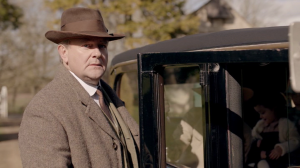
Lord Grantham (Hugh Bonneville)’s remorse — the last stills of the 2nd episode; in the first season Grantham’s remorse led him to keep Mr Bates (Brendan Coyle), not now
It’s remarkable how these phrases all coming down to the same idea, echo and repeat with variations throughout both episodes: the break-up of the old hierarchy was unflinchingly destructive of all.
The key word being surviving (Lady Mary)
You sound like a governess in fear of dismissal … (Dowager to Isobel Crawley)
Miss Baxter (Raquel Cassidy): At least you know you won’t be asked to leave until you’ve got somewhere to go.
Barrow: I don’t know anything of the sort.Interviewer: – Why are you leaving now? –
Thomas: It seems like the right time for a move.
Interviewer: Does it? Does it, indeed?
That’s from the work interview in the second episode, which Fellowes knows as much as anyone else is a form of suppliancy at best, hazing being not uncommon, where Thomas submits to sneers, mortification. What are the duties of an “assistant butler?’ he can ask; he cannot ask for how much on the first go-round. (The first.)
I mean who wants to work in Woolworth’s? Certainly not the Dowager who in the first season couldn’t get over Gwen wanting to go out of “service” to become a typist. Well, in real life my mother-in-law: she traded in a 7 day a week, 11 hour a day job (half day off every other week) for miniscule literal money as a lower governess in a great house for a 5 and 1/2 day week, with a wage that she could just about pay for a flat and her own food on in Woolworth’s. It was much more liberty and money, her own space to live in.
We must give them time to gnash their teeth alone (about the change in power structure of the hospital).
One servant to another: – Did you drink at luncheon? – No, I did not.
Reply: One wrong move and snap, you’re out on your ear.
Consider how Mr Mason grieves when he sees a box he contributed to for some wedding (where he contributed a small sum, so expensive was this box, that took him weeks to save from his income) now on auction. I will be told that I am to read this paradigm and all these utterances ironically, e.g., this is ironic:
Lady Mary: Don’t worry, Carson, your reception will be in the great hall if it’s the last thing I do.
Mr Carson: How reassuring, My Lady.
Edith (Laura Carmichael): How very reassuring .. (Edith was given a few good ripostes)
It’s impossible in context: in the first episode the continuous thread juxtaposed through (until we have our culmination in the auction) is the story of a seemingly smug, remarkably nasty, sneering financially aggressive female hotel servant who lies to intrude herself on Downton Abbey, in order to harass Lady Mary for money because she knows Lady Mary went to bed with the present married Lord Gillingham and can shame Lady Mary in the newspapers. No understanding is given this woman whatsoever. She is like some mean witch a glance at whom leads Lady Mary to fall off her horse. She is as weak though against Lord Grantham (Hugh Bonneville) as — let us recall — an exactly analogous intrusive aggressive female was in the opening episode of the fourth season. Has anyone forgotten the sexually voracious Lady Ansthruther (Anna Chanceller, previously Miss Bingley, her name a perhaps unconscious allusion to Mrs Miniver) who sought to make Jimmy Kent (Ed Speleers) a kept man. In this former story an startlingly old (and some might hope) forgotten stereotype about the sexual appetites of thwarted (i.e., single) women came out.
The most scintillatingly alive moment of the second episode, the most pungently delivered line occurs when the Dowager Lady Grantham revels in a yet another moment of spite: yes her excuse is she is getting back at Denker for telling all the other servants they may be let go (Dencker has replaced Miss Obrien for resident female bitch) by carelessly letting her know she may be fired at any moment.
Sometimes it’s good to rule by fear, Maggie quivers with a spurt of glee. That says it all. Gives the game of inequality away: the 1% enjoy their power. It’s not enough to be rich, you have to be above others and how can you experience this?
But as to costumes, Maggie Smith won hands down.

Indoors – the dark red suits her very well
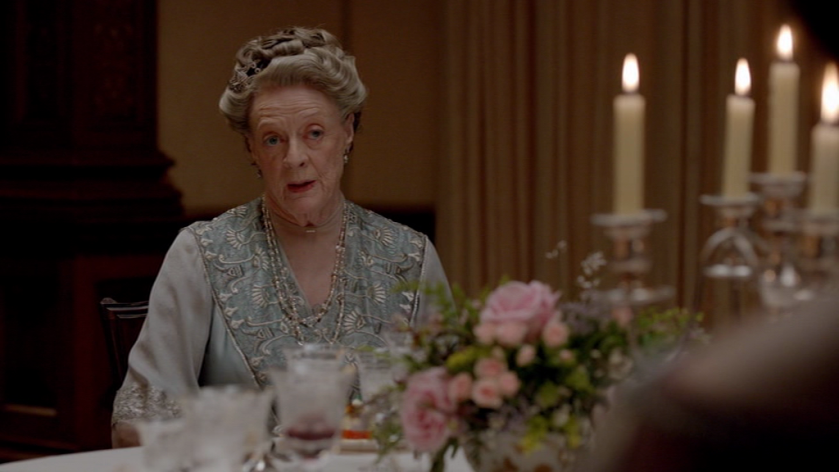
Light blues and greys were favored for her coloring
It seems to me a great effort was made to dress in her a series of exquisitely flattering dresses and place her in angle that favored the outlines of her face, her coloring, caught her body gestures and face. She had so many changes and so many lovely hats, it’s hard to pick. As in previous seasons, Fellowes’s control led to the camera making love to McGovern, so here our aging princess of great actresses. From her career and what I know of her life, Maggie Smith is stuff of the finest spirit.
************************

Barrow walking into the new intimidating place (don’t miss those lions)
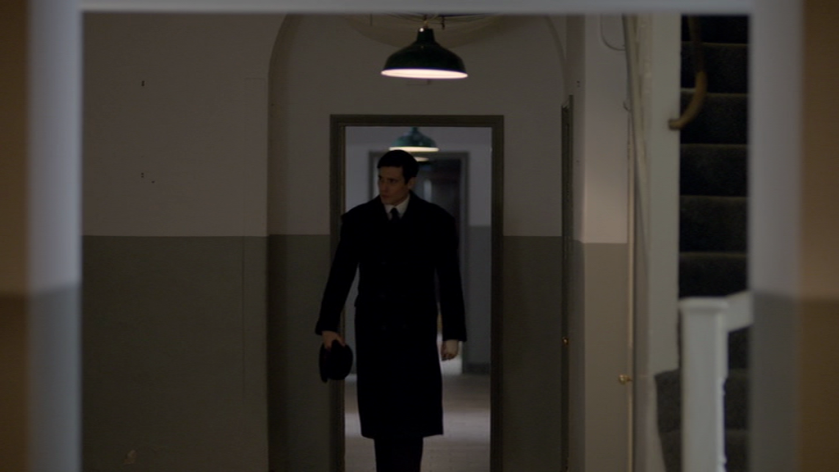
He of course goes into the servant’s entrance

Interviewee not making eye contact

The employer’s unashamed full gaze
So wherein was the 2nd episode superior to the 1st? It returned to the rhythms of the first season. The quiet diurnal feel of every day life. Yes in both of these latest hour concoctions, as he does everywhere, Fellowes slides over the deeper disquiet one should have over any number of incidents in both episodes. The man has an uncanny ability to put his finger on suppurating wounds in relationships and systems and then pull away to safety. It’s safe to dwell on Mrs Hughes’s shyness in marrying Mr Carson who loves her tenderly. Edith’s story and desire to go live in London is told blandly; I’d love to know what Rosamund (Samantha Bond) really does in London. We never do, only that she goes out to plays only when she has friends visiting.

Lady Edith emerging from her manager’s office where she has lost a round, Lady Rosamund Painswick waiting outside — Lady Mary says she and Anna have had so many moments together, so too Lady Rosamund and Edith (over Marigold) but they are kept superficial where we most want to know
In the first episode Fellowes uses the juiced-up faux crisis in thread after thread become so common in film stories (often disguised by having them linked up to some mystery-thriller conclusion). In the second he does not. There is no juiced-up crisis moment in the interview scene of Thomas Barrow. In both he depends on us caring for the characters and I do for a few: Anna and Mr Bates, Daisy and Mr Mason, Miss Baxter and Mr Molseley, and yes even Thomas, so that another of his gift’s — for plangent dialogue and aphorism were effective.

Anna and Mr Bates — camera on her
Some might say he overdoes this in the concluding incident of the Drewes — but then we are made to feel a real wrong is done them when from the car, clutching the child, Lady Edith (Laura Carmichael) and Cora, Lady Grantham (Elizabeth McGovern) smoothly agree ever so quickly with the removal of the Drewes: “it’s for the best.”
One of my commentators recently wrote in response to a couple of my blog remarks: “he refuses to develop his characters in more sophisticated adult ways and deal openly with complex politics”; “fan fictions and postings and blogs too expose the nasty undercurrents of his portrayals, his fatuity“)
Comment; He exposes the weaknesses of his storytelling. I thought the first series of Downton Abbey was brilliant, but I have been progressively more disappointed by subsequent series. As I continued to watch the show, I repeatedly saw him squander enormous potential for emotionally-resonant storytelling.
This emotionally resonant story-telling (thrown away or perverted in the final message or not) was given more play in the second episode. We saw some of it towards the end of the first when Lord and Lady Grantham go down to the kitchen and talk about the food they find in the new refrigerator. The scene quietly epitomizes the theme of changing times: I do not remember either hitherto coming down to the kitchen to grab a snack. Nothing was juiced-up here. After they ate, to bed upstair they retired. In the second episode Mr Molseley (Kevin Doyle) acquiring test exams for Daisy to practice with. For all its slithering cruelty, the way the Dowager handles Dencker is done without juicing the turns. Lady Mary’s reciprocating decent behavior helping Anna to bring a pregnancy to full term.
(Using my crystal ball I predict the birth of a child in the Christmas episode, one who like Lady Mary and Sybil’s child is legitimate with a loving father and mother and assured future.)
The development of the fight over who will control the hospital. Mrs Hughes’s stubborn resistance of a take-over of “her day” by the hegemonic order she has lived in all her life. Not that she escapes it much: I foresee the wedding will be in the schoolhouse (like everything else, as the Dowager would doubtless tell us, standing on the extensive property of Lord Grantham) during this moment of (for her) liminal transition.
The two continuous threads of the second episode concern the question of where the latest wedding (in the series) is to be held and the question of the hospital. I found the dialogues over the hospital improved as the characters (the way they do in soap opera structures) recurred and re-formulated their positions over and over, bringing in new aspects as they went. And will end on two of these from the second episode:
The first intertwined with the thwarted marriage of Isobel Crawley and Lord Merton (Douglas Reith):
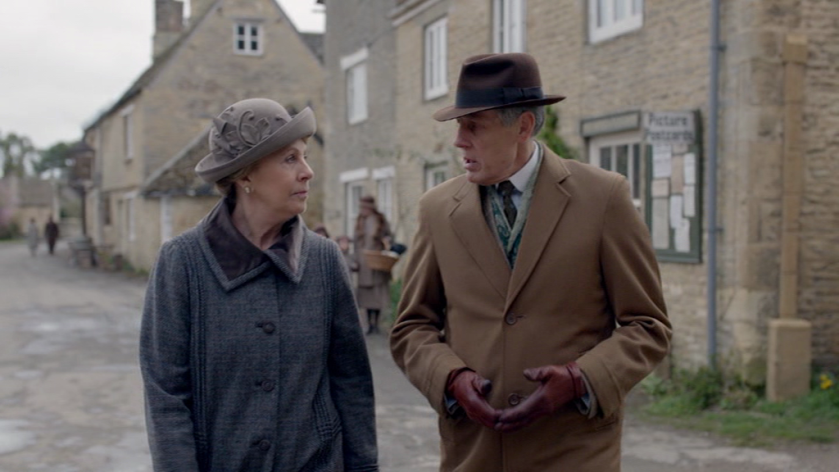
Walking and talking
Isobel: ” – Do you post your own letters?”
Merton: ” – Ha! It was vital it went off today and I’m never very good at delegating. As a matter of fact, I’m glad to see you. I’d value your advice. I’ve had a letter from the Royal Yorkshire Hospital, asking if I’d head the new Board of Charitable Donors. We’d be working alongside.”
Isobel: “Well, that’s if I stay the almoner, once we’ve amalgamated.”
Merton: “Well, of course you would.”
Isobel: “When we combine, we’ll avoid duplicating our efforts. The whole thing would work a lot more efficiently than it does now.”
Merton: “So you don’t disagree with the plan? Well, don’t you see what it could mean? How old is our X-ray machine? Does Clarkson really know how to use it? What advanced surgery do we offer? None.
If a family at the Abbey has a cut finger, they go to London, – but what about everyone else? – I bet you’d go to London too. – (CHUCKLES) I probably would, but I shouldn’t have to. And what about people who don’t have that option? So the battle lines are drawn and now we must fight it out.”
Upon Lady Grantham visiting the hospital (she is leaning towards giving control to a larger authority): part of the context is Isobel and the Dowager’s on-going vexed relationship
Dowager: “I don’t want Cousin Cora to feel outnumbered.”
Isobel: “It isn’t friendly, you know, to stir her up into opposition.”
Dowager: “It’s not very friendly to squash her into submission either.”
Cora: “Excuse me, but I don’t need to be stirred or squashed.”
– The facts speak for themselves.
– Your facts or mine? – What’s the difference? – Mine are the true facts.
Dr Clarkson (David Robb): Shall we continue this in my office?
Dowager: “I wish we could persuade you to help us stem the tide of change.
cora: “I’m just not convinced it’s the right way forward, to go backward.”
Dowager: “I do not understand you, my dear. – Are you saying Dr Clarkson is a bad doctor?
Cora: ” – Certainly not.”
Dowager: “And the other doctors that use our hospital — are they no good either?”
Cora: “I’m sure everyone does their very best, but there are new methods now, new treatments, new machines. Great advances have been made since the war. – Can’t we share in them?”
Isobel: ” – Hear, hear.”
Dr Clarkson: “Of course. I intend that we should.”
Isobel: “- We haven’t got the money.”
Cora: “- I see I’m not needed to lend you strength.”
Dowager: “You’re fully in command of the argument. Have you no pride in what we have achieved with our hospital?
Isobel: “I don’t think pride comes into it.”
Dowager: “Well, I warn you, Dr Clarkson and I will fight to the last ditch.”
And so the Dowager will. So did the aristocrats as a group, including those who lost much property. But these super-rich people, they keep making a come-back. It’s a big deal when they come down to breakfast:
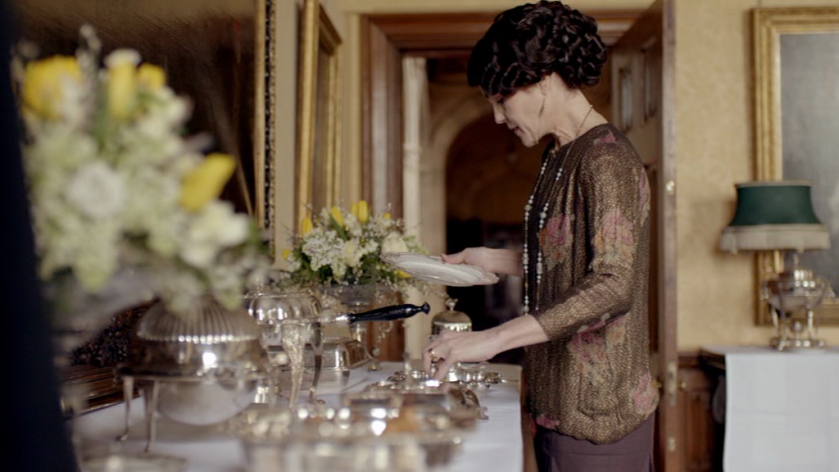
Cora putting together her own meal:
Ellen

From Tracy Marks, what looks like a good mini-series:
I’m going to use the Downton Abbey topic to seque into mentioning another show about which I have the highest recommendations — the Australian series A Place to Call Home is taking the world (at least the female world that I know) by storm. All along, I’ve felt that Downton Abbey has some very shoddy writing and plots………never more so until watching A Place To Call Home, which (at least until the latter 2nd season which gets melodramatic), is as good as a show can get in regard to both plot and character. Season one and two are out in the U.S. (many episodes on Youtube) and season three accessible by subscription to Acorn via Amazon. Interviews with the cast about the series:https://www.youtube.com/watch?v=KXXWRTe2nsA
It is not, however, Victorian or Edwardian but rather post WWII – 1953 to be exact. The main character is Sarah, probably late 30s in age, who converted to Judaism before WWII when she married a Jewish man – who died in a concentration camp. Her own history which is only slowly revealed is quite traumatic. And the anti-semitism she confronts among a few people in Australia – especially when she stumbles upon a family secret and falls in love – creates many complications in her life.
my reply:
I am bothered to see you can’t watch it simply by putting on a TV or going to Netflix but have to have yet another subscription — the cost of cable in the US is not trivial — to access it without buying the DVDs. I have resisted subscribing to the now Amazon-owned company through which most Books on CD, MP3, but increasingly as a download are marketed. I strongly prefer the CD or MP3 version as I listen to CDS in my car. I know my daughter who lives with me now subscribes to services where she gets a whole season at once of a series (this includes Netflix)
But I’ll try one on YouTube. I have been watching The Crimson Field and before that Home-Fires. Home-fires was too pastoral: here we are in WW2 and no bombs are falling, and it reminded me of Cranford Chronicles (which I did love) because all but one of the woman (who is made too mean) are so supportive of one another. It’s not reality and part of life’s difficulties is the limited sympathy or cooperation one gets from even friends. The Crimson Field is much better in that the women are nurses near the front and limited sympathy and cooperation are at the center of this series. The problem here is subtler: what goes wrong too ofren is from a particularly awful person, but sometimes it is the norm, the mores that do a person in or are giving the particular character deep anguish and difficulty.
I did a paper on Trollope and post-colonialism where I read yet more of Australian literature — I’ve had forays into it before. It is so rich because of the colonialist background and all that has brought into the culture, the place the continent is located in and so on.
Ellen
I agree Ellen that the second episode was superior to the first, though I do like the whole impending doom feeling – if the Abbey closes in the end, I will not be sad. I do think it’s a good depiction of this period and we get the feel for the transition from great estates to modern times.
I was bummed by Thomas’ interview. He is my favorite character because I always like the villains best and I feel he is wronged in being made into the villain because he is gay. I was hoping he’d find his boyfriend at the new job and live happily ever after. The way he is depicted as a villain makes you think Fellowes is bigoted towards gay people and I can’t help noticing that Thomas is extremely pale, like they are purposely making him up to look like a vampire.
I will add that the show also depicts our own times – anyone in the workplace today knows what downsizing is about – I’ve been there, being asked to make bricks without straw, or as in the servants’ cases here, asked to do three people’s jobs and be paid only for one and then probably not receive a raise but a paycut on top of it. Times really haven’t changed that much.
Tyler Tichelaar
Tyler, people have argued if you compare the treatment of a homosexual butler in the 1970s Upstairs/Downstairs, Fellowes’s treatment is deeply humane.
Lucy Brown wrote an article (in the book my article on Trollope was published in, Upstairs and Downstairs, ed Leggott and Taddeo) about how Alfred, the gay temporary valet in the 1970s Upstairs/Downstairs ends in Alfred being hanged; he committed a barbaric and premeditated murder. (The new Upstairs/Downstairs had a gay aunt who I loved and is presented so positively throughout. It was such a shame it was cancelled for not high enough ratings.)
If we think back over the whole of Downton Abbey, there has been much empathy for Thomas: at the end of one season where Lord Grantham rescues him from the clutches of Miss Obrien’s Alfred (surely the name is an allusion) who had gone to the cops; we see Thomas grieve, be frightened, need a friend in Jimmy, but on the whole I agree it’s far more often been a deeply negative portrayal: spiteful, cowardly, treacherous and now shamed.
I didn’t want to mention as perhaps overdoing it that a third intrusive character shown to be awful and simply dismissed by Lord Grantham is the Duke of Crowborough (Charlie Cox, now lording it on Daredevil) who steals the letters Thomas plans to blackmail Crowborough with; Crowborough is the heartless mercentary suitor of the naive Lady Mary and is easily ejected. Thomas the sneaking conniving blackmailer. So the show begins repeatedly begins with the ejection of a supposed nasty outcast — gays, older single women, hotel staff maids. This opening of someone unacceptable and easily ejected as a way of defining community is striking once you notice it.
I no longer have a favorite character. I used to love Anna and Mr Bates, my heart has been touched by Mrs Patmore, Mr Mason, Mrs Hughes. I would like to have been touched by Lady Edith, Lady Rosamund Painswick, Tom Branston, Thomas, but I was never permitted to — the first bland and an exploitative portrait, the second blank (hints she was Edith’s mother never panned out), the third used to argue against any socialism, the fourth as we’ve said. I am tired of this exploitative series. But I will take it to its end as it has been a significant sociological event for five years. However, only once every two weeks and no attempts at recaping. I won’t spend the time any more.
I would agree with Tyler that the employment issues mirror our own times. What irks me no end is that they are NOT a mirror of the mid-1920s, when, as we know from Janet Powell (the maid whose book was the genesis of Upstairs/Downstairs) and from upper class memoirs that this was exactly the moment when the servant crisis was so acute that the servants had leverage: at least, the employers were making conciliatory gestures–decorating the servant quarters decently, buying modern kitchen equipment and utensils to make the work easier, no longer requiring shoelaces to be ironed, etc. If Fellowes was making the least attempt to be historically honest, instead of trying to add to contemporary anxieties, he would be showing employers grovelling to get Thomas, not the other way around.
I love it, Diane. You are so right. One of the egregious lies allowed to let stand is Fellowes’ claim to be literally historically accurate. He’s not. Do read my reply on Thomas to Tyler.
The ironing of newspapers is seen in the new 2nd episode once again.
Is anything in the mind of the average viewer watching this show? So many people seem to refuse to admit to any thoughts or desires about what they are watching — except an apparently ultra acceptable swoon over the luxury, outfits, landscapes ….
Diana Ramos: “Awesome!”